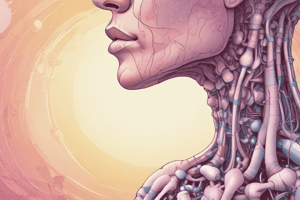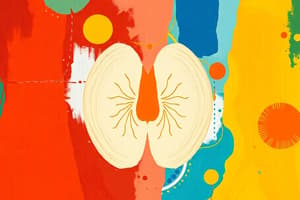Podcast
Questions and Answers
What is the product of deiodination that is considered metabolically inactive?
What is the product of deiodination that is considered metabolically inactive?
- T4
- rT3 (correct)
- TSH
- T3
Which of the following can inhibit the conversion of T4 to T3?
Which of the following can inhibit the conversion of T4 to T3?
- Thyroid hormone replacement therapy
- Starvation (correct)
- Increased iodide intake
- Physical exercise
How does Autoregulation affect thyroid hormone secretion?
How does Autoregulation affect thyroid hormone secretion?
- It regulates iodide uptake independent of TSH. (correct)
- It stimulates the release of TRH.
- It causes an increase in TSH levels.
- It increases the number of TSH receptors.
What role does TSH play in thyroid hormone synthesis?
What role does TSH play in thyroid hormone synthesis?
What is the effect of large amounts of iodine on hormone synthesis?
What is the effect of large amounts of iodine on hormone synthesis?
Which thyroid hormone is almost completely absorbed with minimal interference by food or drugs?
Which thyroid hormone is almost completely absorbed with minimal interference by food or drugs?
Enzyme inducers like rifampicin increase the metabolism of which thyroid hormones?
Enzyme inducers like rifampicin increase the metabolism of which thyroid hormones?
Which of the following disorders is associated with thyroid stimulating immunoglobulin (TSI)?
Which of the following disorders is associated with thyroid stimulating immunoglobulin (TSI)?
What is a common cardiac symptom of hypoproteinemia?
What is a common cardiac symptom of hypoproteinemia?
Which of the following symptoms is NOT associated with respiratory issues due to hypoproteinemia?
Which of the following symptoms is NOT associated with respiratory issues due to hypoproteinemia?
Which condition is directly linked to increased peripheral vascular resistance (PVR)?
Which condition is directly linked to increased peripheral vascular resistance (PVR)?
What ocular symptom is related with hypoproteinemia?
What ocular symptom is related with hypoproteinemia?
Which cardiac effect is likely linked to a decrease in stroke volume (SV) due to hypoproteinemia?
Which cardiac effect is likely linked to a decrease in stroke volume (SV) due to hypoproteinemia?
What is a characteristic respiratory finding in hypoproteinemia?
What is a characteristic respiratory finding in hypoproteinemia?
Which of the following symptoms is associated with periorbital edema?
Which of the following symptoms is associated with periorbital edema?
What is the result of increased heart rate (HR) in hypoproteinemia?
What is the result of increased heart rate (HR) in hypoproteinemia?
What is the primary function of T4 and T3 hormones?
What is the primary function of T4 and T3 hormones?
Which hormone is crucial for calcium metabolism regulation?
Which hormone is crucial for calcium metabolism regulation?
What is a possible consequence of thyroid hormone deficiency during early life?
What is a possible consequence of thyroid hormone deficiency during early life?
What condition is referred to as 'Goiter'?
What condition is referred to as 'Goiter'?
What does hyperactivity of the thyroid gland resemble?
What does hyperactivity of the thyroid gland resemble?
Which organ is NOT affected by thyroid hormones' regulation of resting metabolic rate?
Which organ is NOT affected by thyroid hormones' regulation of resting metabolic rate?
Which hormone is NOT directly synthesized by the thyroid gland?
Which hormone is NOT directly synthesized by the thyroid gland?
What is the approximate weight range of a normal adult thyroid gland?
What is the approximate weight range of a normal adult thyroid gland?
What is a characteristic of neonatal Graves disease?
What is a characteristic of neonatal Graves disease?
What is the primary cause of non-toxic goiter?
What is the primary cause of non-toxic goiter?
What is the best initial treatment for non-toxic goiter?
What is the best initial treatment for non-toxic goiter?
What is the management approach for thyroid neoplasm?
What is the management approach for thyroid neoplasm?
Which medication can be added to treatment to prevent the conversion of T4 to T3 in neonatal Graves disease?
Which medication can be added to treatment to prevent the conversion of T4 to T3 in neonatal Graves disease?
What dietary source is recommended to manage iodine deficiency related to goiter?
What dietary source is recommended to manage iodine deficiency related to goiter?
What is the main deficiency in hypothyroidism?
What is the main deficiency in hypothyroidism?
Which condition is characterized by severe hypothyroidism at birth due to iodine deficiency?
Which condition is characterized by severe hypothyroidism at birth due to iodine deficiency?
What is the initial treatment approach for drug-induced hypothyroidism?
What is the initial treatment approach for drug-induced hypothyroidism?
What role does the hormone TSH play in hypothyroidism diagnosis?
What role does the hormone TSH play in hypothyroidism diagnosis?
Which of the following is NOT a cause of hypothyroidism?
Which of the following is NOT a cause of hypothyroidism?
What is the typical levothyroxine dosage for adults managing hypothyroidism?
What is the typical levothyroxine dosage for adults managing hypothyroidism?
Which of these conditions is an autoimmune disorder affecting the thyroid?
Which of these conditions is an autoimmune disorder affecting the thyroid?
What can result from untreated hypothyroidism in infants and children?
What can result from untreated hypothyroidism in infants and children?
Flashcards are hidden until you start studying
Study Notes
Introduction to Thyroid Hormones
- The adult thyroid gland weighs 15-25 g and is located in front of the neck.
- Major hormones produced include tetraiodothyronine (T4), triiodothyronine (T3), and calcitonin.
- Iodine is crucial for the synthesis of T4 and T3, which are essential for growth, development, and metabolism.
- Calcitonin regulates calcium metabolism.
- Thyroid hormones are vital for the function and maintenance of all body tissues; deficiency can lead to irreversible mental retardation and dwarfism.
- Thyroid hormones also influence other hormone secretions and degradation.
Regulation of Thyroid Hormone Secretion
- Autoregulation: The thyroid gland autocompensates iodide uptake based on iodine levels, with excessive iodide inhibiting hormone synthesis.
- Thyroid-Pituitary Feedback: Thyrotropin-releasing hormone (TRH) stimulates the synthesis of thyroid-stimulating hormone (TSH), which promotes the release of T4 and T3.
- Abnormal Thyroid Stimulators: Graves' disease involves TSH receptor-stimulating antibodies which induce hormone secretion.
Pharmacokinetics of Thyroid Hormones
- Absorption: T4 is well absorbed from the duodenum and ileum; food and certain drugs may impair its absorption. T3 has minimal interference during absorption.
- Metabolism: Occurs predominantly in the liver; enzyme inducers may require dose adjustments for T4 to maintain effectiveness. In hyperthyroid patients, metabolic clearance increases.
Hypothyroidism Overview
- Characterized by a deficiency of thyroid hormones, leading to a general slowdown of body functions; it can be reversible.
- Symptoms in infants include growth retardation, potential dwarfism, and irreversible mental retardation.
- Diagnosis involves laboratory tests showing low free T4 and elevated serum TSH.
Causes of Hypothyroidism
- Drug-Induced: Medications blocking hormone synthesis (e.g., lithium, thioamides) can lead to mild to moderate hypothyroidism.
- Dyshormoogenesis: Enzyme deficiencies impair T4 synthesis, often accompanied by goiter.
- Destructive Factors: Radiation or surgical removal of the thyroid gland results in severe hypothyroidism without goiter.
- Congenital Factors: Cretinism is caused by iodine deficiency and severe hypothyroidism is present.
- Pituitary/Hypothalamic Disease: Absence of TSH leads to mild hypothyroidism.
- Hashimoto's Thyroiditis: An autoimmune disorder causing thyroid destruction, initially presenting with goiter.
Management of Hypothyroidism
- Drug-induced hypothyroidism managed by withdrawing the offending agent, supplemented with levothyroxine.
- Levothyroxine dosages: infants receive 10-15 µg/kg/day while adults need 1.7 µg/kg/day.
- During pregnancy, propylthiouracil (PTU) is preferred to avoid radioiodine exposure to the fetus.
Neonatal Graves' Disease
- Occurs in newborns from maternal transmission of antibodies or genetic predisposition; usually self-limiting within 4-12 weeks.
- Treatment can involve PTU, iodine, propranolol, and supportive care, with gradual withdrawal as the infant improves.
Non-Toxic Goiter
- Characterized by thyroid enlargement without excessive hormone production, often due to inadequate thyroid synthesis.
- Commonly caused by iodine deficiency; can also result from dietary goitrogens or neoplasms.
- Treatment involves administering iodine prophylactically, with daily intake advised at 150-200 µg.
Thyroid Neoplasm
- Thyroid tumors can be benign or malignant; biopsy is essential for diagnosis.
- Management typically involves total thyroidectomy, radioiodine therapy, and lifelong levothyroxine replacement therapy.
Studying That Suits You
Use AI to generate personalized quizzes and flashcards to suit your learning preferences.




